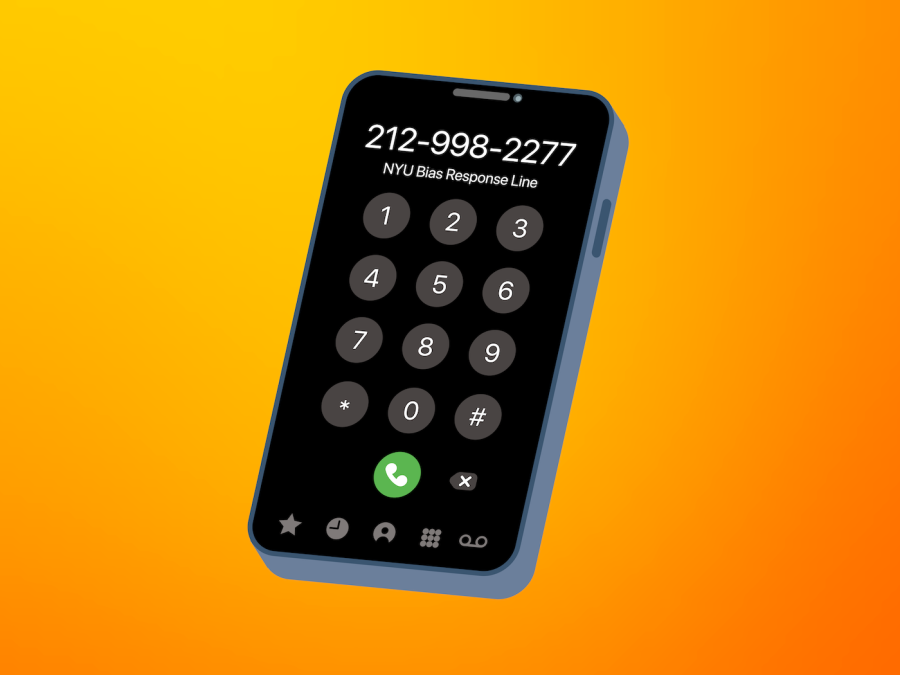NYU bias hotline ensnared in war on ‘wokeness’
Former NYU student Rikki Schlott, a New York Post columnist, criticized NYU’s bias response line for hindering free speech. NYU and its students are confused as to why.
September 9, 2022
During her appearance on the HBO talk show “Real Time” last month, former NYU student Rikki Schlott conversed with host Bill Maher about the political leanings of her generation and the importance of free speech. Schlott then brought up an anecdote from her time at NYU: the Bias Response Line, a phone number where students can report cases of discrimination and harassment on campus.
“It’s a hotline in case you’re offended and your feelings are poked and prodded,” Schlott, who describes herself as “politically homeless,” told Maher on the show.
In a later article for the New York Post, where she is a columnist, the libertarian commentator denounced the hotline, characterizing it as antithetical to free speech. She accused NYU of promoting a “witch hunt culture” by continuing to use the phone number.
Schlott has made appearances on “Fox and Friends,” a conservative talk show, and co-hosts a podcast called “Lost Debate,” which claims to be “courageously confrontational” and covers topics including student loans, masculinity and veganism. Schlott has also previously called Cardi B’s song “WAP” a contributor to the “degradation” of women and has written about how she believes that liberal media coverage about transgender people is harmful to youth.
Along with her criticism of the bias hotline, Schlott has been a regular critic of liberal bias in higher education, recently writing that graduating college classes present a “potential HR disaster” for their future employers.
NYU spokesperson John Beckman said that although the bias hotline had received some complaints from university community members in the past, students seem to be in favor of having an accessible way to report bias. He also explained that the hotline was established following student input during a 2015 town hall held by the university to discuss diversity, equity and inclusion initiatives on campus.
“One of the frustrations that was repeatedly expressed by students was a lack of clarity about how they should report an incident of discrimination or bias,” Beckman said. “Then-provost David McLaughlin wrote to the community to say that among the steps the university would be taking in response to the issues raised was the establishment of a ‘hot line’ — that is, a central place where students could call with concerns about bias or harassment. That’s a good thing, not a bad thing.”
Several students were surprised to learn about the Post’s coverage of the hotline, explaining that they see it as a rarely-mentioned piece of information that fits in alongside the other phone numbers that are listed on the back of every student’s NYU ID — those for NYU Campus Safety and mental health resources on campus. GLS sophomore Maame Sey said that she was barely aware of its existence, despite the phone number’s inclusion in the syllabi of most classes and on ID cards.
“I don’t think I would really know what it is,” Sey said. “When I hear it, it’s from the syllabus and something you sort of overlook. You’re like, ‘OK, I just have to read this because it’s here’ — not necessarily knowing what it is.”
Tisch sophomore Tanner BenDebba said that he has concerns about the university overlooking reports made using the hotline, but believes it can help students feel comfortable filing incidents of bias. He said that if he were to report an instance of discrimination, he would be more likely to use the bias hotline than reach out to the Campus Safety.
“Last year, I had a lot of friends who had issues with Campus Safety officers where they would very clearly have an issue — and proof of said issue — and then nothing would be done,” BenDebba said. “They would literally be like, ‘Well, what do you want us to do about it?’”
Schlott’s statements about the bias hotline are emblematic of a wider conservative push against aspects of U.S. education that the group views as left-leaning, such as trigger warnings and diversity, equity and inclusion initiatives. A number of right-wing organizations have grown in prominence in recent years as a result, including Turning Point USA, a non-profit that currently maintains a “watchlist” of left-leaning professors, and the Foundation for Individual Rights and Expression, which advocates for free speech across academic institutions.
Conservative criticism has cropped up at universities that are perceived to be largely left-leaning as well. At NYU, one former and one current professor were recently involved in starting a new “anti-woke” university in Austin, Texas. The university, which has no accreditation or campus, prioritizes “the pursuit of truth” and “freedom of inquiry.”
Although he felt uncertain about the bias hotline’s effectiveness, BenDebba was skeptical of its characterization by Schlott and the Post.
“The first problem we have is the fact that it’s coming from the New York Post, because if you’re getting anything from there, like you gotta get your head checked,” BenDebba said.
Contact Connor Patton at [email protected].
























































































































































